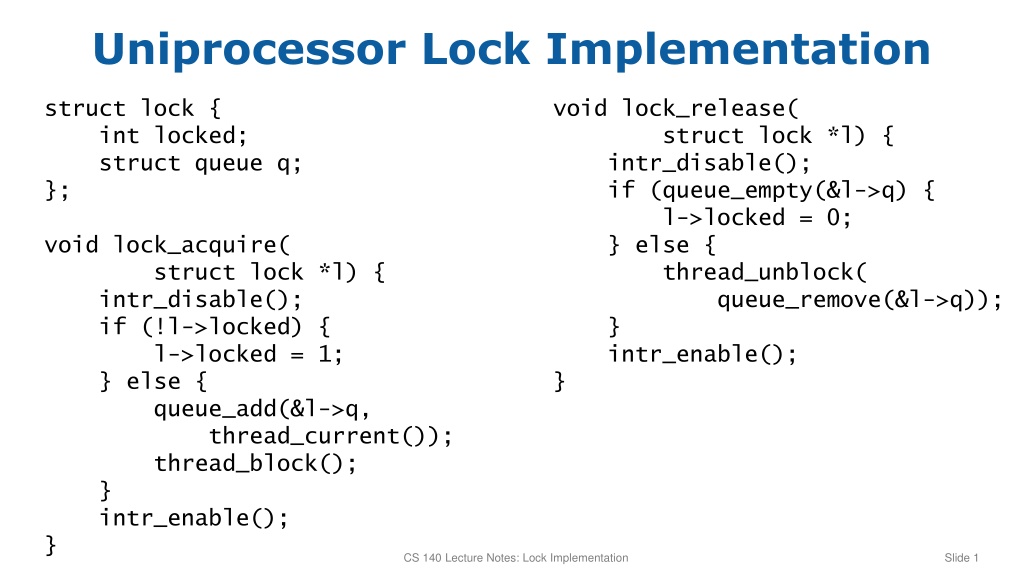Lock Implementation Strategies for Single-Core and Multi-Core Systems
The provided content outlines several lock implementation strategies for both single-core and multi-core systems. It covers the structures, functions, and techniques used to manage locks efficiently, including releasing locks, acquiring locks, and handling synchronization. Different versions of lock implementations are discussed, each tailored for specific system architectures and requirements. The content also includes examples and visuals to aid understanding of the concepts discussed.
Download Presentation

Please find below an Image/Link to download the presentation.
The content on the website is provided AS IS for your information and personal use only. It may not be sold, licensed, or shared on other websites without obtaining consent from the author. Download presentation by click this link. If you encounter any issues during the download, it is possible that the publisher has removed the file from their server.
E N D
Presentation Transcript
Uniprocessor Lock Implementation struct lock { int locked; struct queue q; }; void lock_release( struct lock *l) { intr_disable(); if (queue_empty(&l->q) { l->locked = 0; } else { thread_unblock( queue_remove(&l->q)); } intr_enable(); } void lock_acquire( struct lock *l) { intr_disable(); if (!l->locked) { l->locked = 1; } else { queue_add(&l->q, thread_current()); thread_block(); } intr_enable(); } CS 140 Lecture Notes: Lock Implementation Slide 1
Locks for Multi-Core, v1 struct lock { int locked; }; void lock_release( struct lock *l) { l->locked = 0; } void lock_acquire( struct lock *l) { while (swap(&l->locked, 1)) { /* Do nothing */ } } CS 140 Lecture Notes: Lock Implementation Slide 2
Locks for Multi-Core, v2 struct lock { int locked; struct queue q; }; void lock_release( struct lock *l) { if (queue_empty(&l->q) { l->locked = 0; } else { thread_unblock( queue_remove(&l->q)); } } void lock_acquire( struct lock *l) { if (swap(&l->locked, 1)) { queue_add(&l->q, thread_current()); thread_block(); } } CS 140 Lecture Notes: Lock Implementation Slide 3
Locks for Multi-Core, v3 struct lock { int locked; struct queue q; int sync; }; void lock_release( struct lock *l) { while (swap(&l->sync, 1)) { /* Do nothing */ } if (queue_empty(&l->q) { l->locked = 0; } else { thread_unblock( queue_remove(&l->q)); } l->sync = 0; } void lock_acquire( struct lock *l) { while (swap(&l->sync, 1)) { /* Do nothing */ } if (!l->locked) { l->locked = 1; l->sync = 0; } else { queue_add(&l->q, thread_current()); l->sync = 0; thread_block(); } } CS 140 Lecture Notes: Lock Implementation Slide 4
Locks for Multi-Core, v4 struct lock { int locked; struct queue q; int sync; }; void lock_release( struct lock *l) { while (swap(&l->sync, 1)) { /* Do nothing */ } if (queue_empty(&l->q) { l->locked = 0; } else { thread_unblock( queue_remove(&l->q)); } l->sync = 0; } void lock_acquire( struct lock *l) { while (swap(&l->sync, 1)) { /* Do nothing */ } if (!l->locked) { l->locked = 1; l->sync = 0; } else { queue_add(&l->q, thread_current()); thread_current()->state = BLOCKED; l->sync = 0; reschedule(); } } CS 140 Lecture Notes: Lock Implementation Slide 5
Locks for Multi-Core, v5 struct lock { int locked; struct queue q; int sync; }; void lock_acquire( struct lock *l) { intr_disable(); while (swap(&l->sync, 1)) { /* Do nothing */ } if (!l->locked) { l->locked = 1; l->sync = 0; } else { queue_add(&l->q, thread_current()); thread_current()->state = BLOCKED; l->sync = 0; reschedule(); } intr_enable(); } void lock_release( struct lock *l) { intr_disable(); while (swap(&l->sync, 1)) { /* Do nothing */ } if (queue_empty(&l->q) { l->locked = 0; } else { thread_unblock( queue_remove(&l->q)); } l->sync = 0; intr_enable(); } CS 140 Lecture Notes: Lock Implementation Slide 6

















































